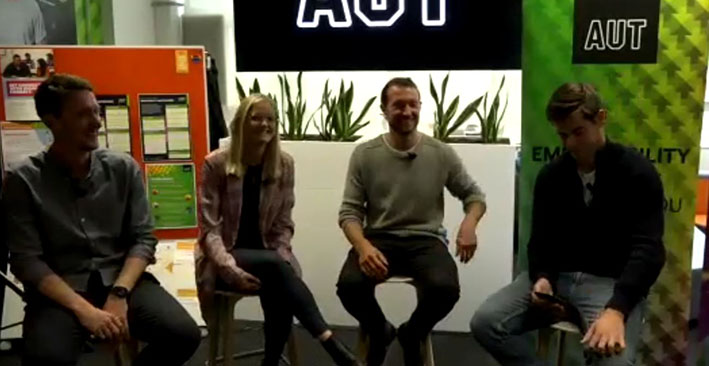Be creative, hustle, get in front of people, give anything a go and do your research. That was the advice from 6 creative young employers who attended various sessions at AUT this semester. They’ve all experienced rejection and success. They may even be hiring. See what they have to say.
1/ Be creative
You need to be creative to stand out, states Georgia McGillivray, The Social Club CEO and founder who recently successfully sold her start up.
“An intern from AUT created an Instagram profile and did a creative video every day about the skills he’d taught himself and why he wanted to work for us, then after a month he came to see us with his CV and this platform.
He got an internship and then a job because of his persistence and resilience, but also because he was speaking our language, says Georgia.
Dave Cameron CEO and founder of Learn Coach received a similar pitch. He was sent a three minute video from someone who’d researched the company and talked about who they were, what they liked about the company and how they could add value.
“So much effort went into this. It showed they really wanted to work for us – which made me feel special – and also made me think of how good it would be to have that effort and energy around us.”
However David points out that start ups often can’t offer more than a three month contract because of funding.
“If you get a chance, work hard and get involved. When I see people working really hard on a small project, then they’re likely to be offered more work or full time jobs as they come up.”
2/ Don’t rely on job boards alone

Job boards are only one of many channels used to advertise roles - many businesses also use their own channels. The Social Club actively used LinkedIn, Instagram and emails when looking for staff because they couldn’t afford to advertise on Trade Me or SEEK initially.
Ryan Joe, who is product and marketing general manager of tech startup The Instillery says they have a number of summer internships and projects and he encourages students to send through their CV and contact details.
“ Follow us on LinkedIn. We post industry news, so you’ll discover what is going on, including events we run that you can attend. There are always opportunities. Come and chat, we love to talk about what we do. The right thing will come along if you put the time and effort into finding it," he adds.
3/ You've got to hustle
“Hustling is a great skill,” says Georgia. “You will prove your hustle by finding us, following us and responding to us. Do research and don’t be afraid to reach out. You’ll be surprised how often people will respond. And if they don’t respond it is probably because they’re just too busy, so don’t get discouraged.”
Georgia also suggests getting involved in the Startmate Fellowship programme https://www.startmate.com.au/blog/startmate-fellowship-applications-open and On Deck https://www.beondeck.com/ ,a community full of founders, investors and others wanting to get into start ups.
“Find those sorts of things and network, do research and say yes if anyone asks for a coffee. You’ll always get something to take away whether words of wisdom, names to approach etc.”
4/ Know and show your skills
If you don’t have specific experience, think of other ways you can show you’ve got the skills we want, says Andy.
“Have you have run parties for a large amount of people or have been a competitive individual sports person or got very involved in a community initiative? Show you take an action and can see a gap and do something with it. That attitude is incredibly important to a small business and will set you apart in an interview - but only if you recognise it.”
An idea is worthless until something is done with it - and showing you can do something is what makes the difference on a CV or during a chat or interview, says Andy..
“Showing you can execute in some way shape or form goes a long way and is often a deciding factor. Very few people do something with their ideas so show us your record in doing something - it will make a difference.”
5/ Keep up with your industry
Find companies that really interest you or are starting new things or raising new capital, says Georgia, and stay up to date with what’s happening in your industry, .
“Do your research and find communities to follow.”
Founder and CEO of My Auto Shop Andy Bowie tells the story of a friend looking to change career a couple of years ago. The friend looked at the big investment firms to see what they’d invested in overseas and noticed that electric scooters were becoming very popular. He invested in bringing them here – and that’s how Lime Scooters arrived on our shores.
6/ Get in front of people
Creative agency RUN co director Raymond McKay says he always want to meet people to see if there is synergy.
“Communications and advertising is a people business. Instead of sending an email, get in front of us and talk to us. How? Find out names of people you want to work for, then call them and ask to meet. Remember Reception don’t know you’re cold calling the boss.
Raymond adds it is important to take your portfolio along when you have a korero. “We hire on your work as well as whether we are going to get along with you.
"Get ballsy. You can only try and they can only say no. Ka pai, next agency. There will be someone you can gel with,” says Raymond
7/ Get a foot in the door
It is a tough market so go for opportunities even if they’re not at the level you were hoping, says Matt Stenton, Programme Director of Go With Tourism.
“Businesses need fresh young talent to push their businesses forward in this more digital world. You’ll find there is a lot of room to move if you have the right attitude. Before Covid there was a skilled shortage of 35,000 to 40,000 of skilled workers, filled by overseas workers. This is a chance here to build up the numbers of Kiwis working in tourism.”
8/ Be open to opportunity
Use your downtime while looking for a job to do other stuff. Invest in yourself, advises Ryan .
“What do you do to keep up with latest technology and network. The way the world is shifting, are there other careers opening up? Your skills are often transferable. Have the right attitude, desire to learn and to be a good person.”
Start Up Panel, Employability Matters. L to R: CEO and founder of Learn Coach David Cameron, The Social Club CEO Georgia McGillivray, My Auto Shopfounder and CEO Andy Bowie, Sidekicker GM NZ Alex Devereux
Written by AUT Employability and Careers writer Angela McCarthy







